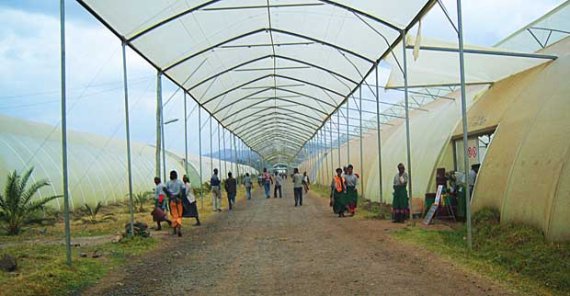Rose farmers in Ethiopia use too much artificial fertilizer and pesticide. And that goes for the Dutch rose farmers as much as for the others, shows a life cycle analysis by Abiy Sahle. Roses have been booming business in Ethiopia recently. There are currently about 100 rose farmers there. The smallest farms have five hectares of roses in plastic greenhouses, while the largest have as many as 200 hectares. About half the companies are in foreign hands, and it is mainly Dutch horticulturalists who have invested in Ethiopia in recent years. For his MSc degree, Sahle, who has now graduated and is working for the Ethiopian horticultural export organization, gathered data from 21 rose farmers. ‘International competition has made sustainable production an issue,’ says Sahle. ‘That is why the companies need to improve their score on environmental impact.’ His life cycle analysis shows that the rose farmers use too much artificial fertilizer, causing surplus chemicals to be washed away into the soil. The production of this fertilizer is also very energy-intensive. Meanwhile, pesticides and insecticides used on the roses release toxic substances, and it is these which do the lion’s share of the damage to the environment. Their impact is much bigger than that of the local transport bringing the roses to the airport to be flown to the auction floors in Europe, write Sahle and his supervisor José Potting in the scientific journal Science of the Total Environment.
Information gap
In the Dutch rose companies there is an information gap between the management and the workers, notes Sahle, who is a trainer for horticultural companies himself. The workers in rose companies do not know enough about responsible dosing of fertilizer and pesticides. They do not know what is the minimum required for a good harvest. To complicate matters further, the trained staff change jobs frequently, so that knowledge is not built up and kept in the companies. In Sahle’s view, companies should run trials with lower amounts of artificial fertilizer, as well as embrace integrated crop protection so as to cut the amounts of chemicals used. Another option is for Ethiopian farmers to start growing roses on artificial substrate, as they do in the Netherlands. Then the artificial fertilizer can be recycled.

